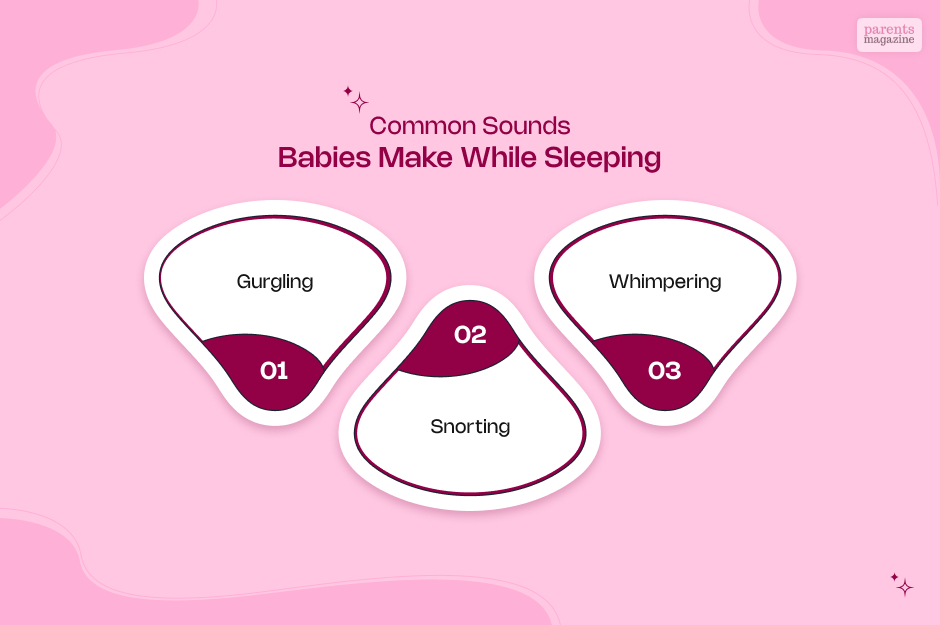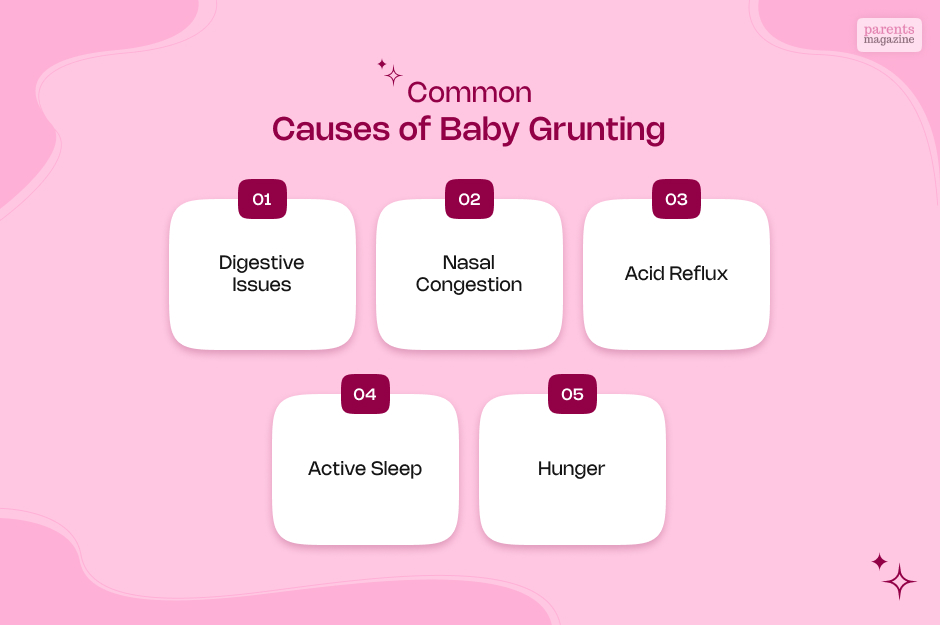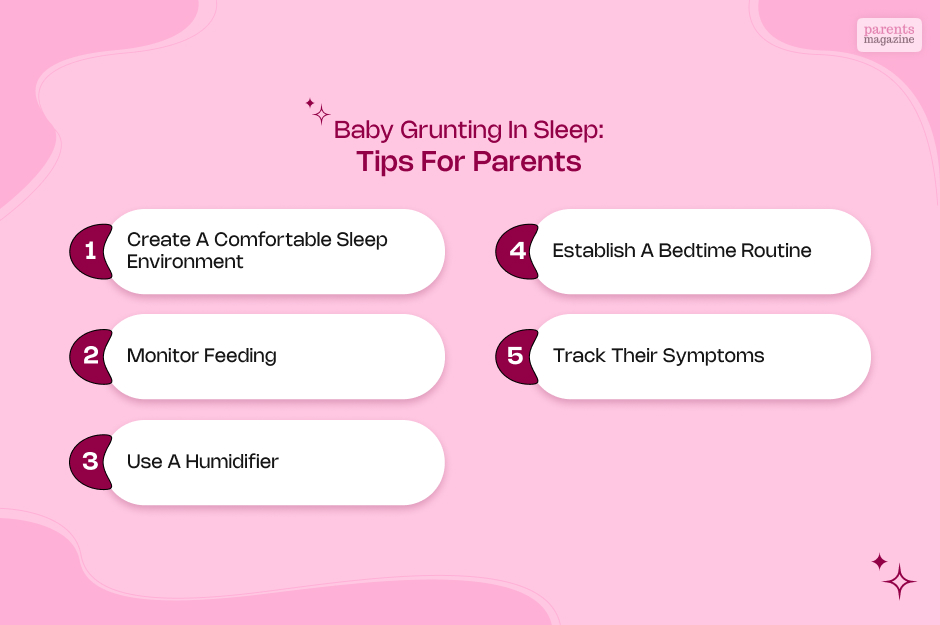
Baby Grunting in Sleep: What Every Parent Should Know
What’s the reason for my baby grunting in sleep?
One of the most heartwarming experiences as a parent is to see your child sleep soundly. However, this tranquil feeling is often accompanied by unexpected noises and sounds like grunting.
Often, this feeling comes with the unexpected sounds of noises. It sounds like grunting. As a parent, this sound is unexpected and difficult to work with.
It’s common for parents to be concerned about their little ones under such conditions. We wonder, “Why is my baby grunting in his sleep?” or “When will my baby stop grunting in sleep?”
Trust me, you are not alone if you are experiencing the same thing. In this article, we have discussed what your baby grunting means and provided tips to help you manage it.
What is Baby Grunting in Sleep?

Baby grunting refers to the throaty sound little ones make when sleeping. This is a common sound for a baby to make when they are around a month old and in their early life phase.
This grunting sound also accompanies other sounds like gurgling, snorting, and even whimpering when babies transition between different sleep stages.
Babies can make grunting sounds during REM (Rapid Eye Movement). It is a stage in their development phase, and babies often experience rapid brain activity during this phase, and they may also dream. New parents who may not have expected such behavior from their baby might feel confused at the grunting sound.
So, what better ways to understand babies grunting in their sleep? Yes, you can start by understanding their sleep stages.
Understanding Sleep Stages

Babies have a comparatively shorter sleeping cycle when compared to the adults. Their sleep cycle is short, and each sleep time is 50 to 60 minutes. Each of their sleep stages has deep sleep, light sleep, and REM sleep. When babies are in light sleeping stage, they can experience light sleep movements, vocalizations, and grunting sounds.
Common Sounds Babies Make While Sleeping

Grunting isn’t the only sound your little one might make when they are sleeping soundly. There can be multiple different types of sounds. Your baby may make sounds like grunting and other different sounds. For example –
Gurgling: This sound may indicate that your baby is transitioning between sleep stages. It can also suggest that they are experiencing digestive activity.
Snorting: Snorting can often occur if your baby has nasal congestion or is adjusting their breathing patterns.
Whimpering: Your baby might be whimpering when they are dreaming or facing some level of discomfort.
As a parent, you must know how to differentiate between healthy sounds and the ones that you should be concerned about.
Common Causes of Baby Grunting

If you hear your baby grunting in sleep, there can be many reasons. Some most common reasons include –
Digestive Issues
One of the primary reasons for grunting is digestion-related issues. Babies aged around one month are still learning how to control their digestive system. They might grunt when trying to pass stool or pass gas. This phenomenon is often branded as “grunting baby syndrome.” In medical terms, it’s called dyschezia.
Babies may struggle with gas buildup during the first few months of their life due to immature digestive systems. They use grunting as a mechanism to easily pass gas or stool.
Nasal Congestion
Babies have tiny nasal passages. It’s easy for them to get their nose congested with mucus. This blockage in their nose can cause breathing issues, leading to grunting noises.
Nasal congestions happen due to allergies, cold, dry air, etc. Allergies can typically cause congestion when allergic to pet dander, dust millet, etc. Viral infections, colds, and dry air can also cause nasal congestion.
Acid Reflux
Gastroesophageal reflux (GER) happens in babies when the stomach contents flow back into the baby’s oesophagus. This causes discomfort, leading to grunting sounds when the baby is sleeping.
It’s common among infants to have acid reflux, and it happens due to an immature lower esophageal sphincter. Do consult your pediatrician for advice if your little one is vomiting, spitting up, having irritability when feeding, and having a poor weight gain process.
Active Sleep
Babies have different sleep cycles. Sometimes, they might grunt, make different noises, or even dream and shift positions. These are the stages when babies are prone to vocalizing their words because of increased brain activity.
Hunger
Baby grunting in sleep can be a sign of hunger. When your baby is hungry during sleep, they may often signal hunger cues with grunting noises. They can often make noises to make signals for food.
Baby Grunting in Sleep: Should Parents Worry?

Yes, babies grunting during sleep is normal, but when should they worry? Are there any uncommon signs that they should worry about? Here are some signs to check –
Difficulty Breathing: if the baby has difficulty breathing during sleep, grunts, and shows signs of distress, it might be concerning. If you see these signs, it’s best to take them to the doctor.
When Should Parents Worry?

It’s common for your little one to grunt. But, it would help if you looked out for specific concerns that might be worrisome and need medical attention. Some of them include the following –
Difficulty Breathing
The first sign that should be worrisome is seeing your little one distressed while grunting. This starts with flaring their nostrils or retractions. If this is happening with your little one, consult a paediatrician.
Persistent Grunting
When your little one is grunting a lot and continuing beyond the first few months of their birth, it might be a good time to consider medical advice. You may want to look for symptoms like lethargy and fever and seek medical advice. A persistent grunting can be connected to an issue that needs medical attention.
Changes in Behavior
If you see a sudden change in your baby’s feeding patterns and behaviors, it could indicate that there’s possibly an underlying reason that needs attention. If your baby starts to act fussy and irritable suddenly, it’s better to seek help from a healthcare expert.
Baby Grunting in Sleep: Tips for Parents

So, when your little one is constantly grunting during sleep, here are some tips to help them cope with it –
1.Create a Comfortable Sleep Environment
A peaceful sleep can be created. You can help your baby sleep peacefully by making the environment more comfortable. Ensure their sleeping place (crib/bed) is free from all the allergens. Also, maintain a moderate room temperature of around 68-72°F. Use breathable bedding and avoid using heavy blankets that might cause suffocation.
2. Monitor Feeding
Keep checking how your baby’s feeding pattern changes. You may want to consider their feeding schedule if he’s constantly hungry at night. It would also be a better decision to consult with a healthcare expert. They should be able to help you understand your baby’s hunger cues and how to react to them.
3. Use a Humidifier
Baby grunting in sleep? Are you sure that your baby doesn’t have a congested nose? If it is why your little one grunts more often, try having a humidifier at your place.
4. Establish a Bedtime Routine
Build a bedtime routine for your baby to help them work on their sleeping pattern. This will help them with better sleep and give them peace of mind with all the other things you need to keep in mind.
5. Track Their Symptoms
The best way to solve your baby’s grunting in sleep is by understanding their behavior. You can note when they start to grunt or have other common behaviors during sleep. This way, you’ll identify patterns that make it difficult for your baby, contributing to the noise.
When Do Babies Stop Making Sleep Noises?

Babies stop making the grunting noise when they are six months old or older. At this age, they start to develop stronger digestive systems, and their breathing pattern also improves. With these developments, grunting improves significantly.
So, when does baby stop grunting in sleep? Although that’s the age for most babies to stop grunting, some babies would take longer. That’s because every baby is unique, and some may take a little longer than others. But for most babies, when they are around 1 year old, they build a better sleeping pattern and have fewer vocalizations during sleep.
Home Remedies for Managing Grunting

Even when seeking medical help for reducing your baby’s grunting, you can try a few home remedies.
Gentle Tummy Massage: Tummy massage helps reduce gas and promotes your baby’s digestion. Keep giving your baby a circular motion with a fingertip on the little one’s abdomen.
Bicycle Leg Exercise: Another way to pass gas and relieve your baby of the gas that’s stuck inside their tummy is by giving them bicycle exercise.
Burping During Sleep: Burping during feeding or before putting your little one to sleep also works. You can also burp them during sleep but be a little careful when burping them during sleep.
Keep Baby Upright After Feeding: Your baby might be grunting if their’s gas stuck in their tummy. It’s better to hold them upright for at least 20 minutes after feeding them.
When to Consult a Professional
When the grunting becomes persistent and accompanies other issues, it’s important to consult a healthcare professional. Additionally, if your baby exhibits any of the following symptoms alongside grunting, then it’s time to consider medical help –
- Rapid breathing
- Unusual lethargy
- High fever
- Difficulty feeding
- Poor weight gain
It’s common among babies, and parents often deal with similar issues throughout their parenting journey. However, as you keep understanding what feels difficult for your little baby, you’ll know when to seek medical help and when not to.
However, seek medical advice promptly to rule out any serious conditions affecting their health. You can take the five symptoms mentioned above as massive red flags.
You May Like To Read This:
Already have an account?
Sign In
Create your account
User added successfully. Log in








